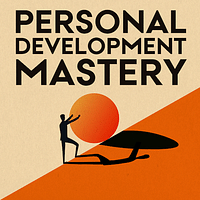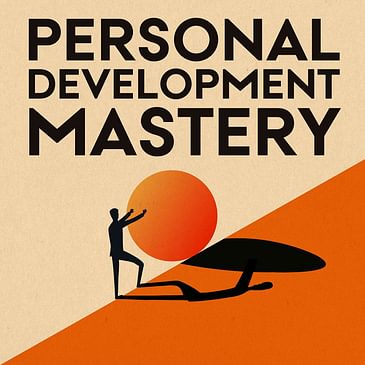Snippet of wisdom 34.
In this series, I select my favourite, most insightful moments from previous episodes of the podcast.
Today's snippet is from my conversation with Uzma Naqvi, a holistic transformational coach.
The snippet I have chosen is about improving your emotional intelligence and managing your emotions.
I hope it is as insightful for you as it was for me!
⠀
𝗩𝗔𝗟𝗨𝗔𝗕𝗟𝗘 𝗥𝗘𝗦𝗢𝗨𝗥𝗖𝗘𝗦
Listen to the full conversation in episode #061:
⠀
𝗔𝗕𝗢𝗨𝗧 𝗧𝗛𝗘 𝗛𝗢𝗦𝗧
I am Agi Keramidas, a podcaster, mentor, and knowledge broker. My mission is simple - to inspire you to take action towards a purposeful and fulfilling life.
⠀
𝗦𝗨𝗠𝗠𝗔𝗥𝗬
This episode discusses building emotional intelligence through two components: gaining insight into your emotions by reflecting on what each emotion is trying to tell you rather than ignoring them, and taking control of your emotions by understanding what you want to feel instead of reacting in the moment. It also talks about the importance of allowing yourself to feel emotions fully to understand the underlying messages and layers. Other topics covered include setting boundaries, having self-respect so others know how to treat you, making lists of what triggers good and bad feelings, and focusing on cultivating more positive emotions like happiness and joy for both mental and physical well-being.
EPISODE TRANSCRIPTION
___
Please note that while an effort is made to provide an accurate transcription, errors and omissions may be present. No part of this transcription can be referenced or reproduced without permission.
___
Agi Keramidas 0:03
Welcome to Personal Development mastery podcast. And this is another snippets of wisdom episode where I select my favourite most insightful moments from previous episodes. Today's snippet comes from my conversation with Uzma Naqvi, who is a holistic transformational coach. The snippet that shows from that conversation is about improving your emotional intelligence and managing your emotions. I hope it's as insightful for you as it was for me.
Uzma Naqvi 0:38
So your emotions are so much attached to how you put your feelings out. And that is directly going to have an impact on what kind of behaviour you have, what kind of conversation you end up having. For me, I think there are two components to building emotional intelligence. Number one is the insight into your emotions. So no emotion comes without a reason every emotion comes to you with a message. And it's for us to stop and reflect and analyse what emotion is there to give you what insight is it giving you whatever emotion it is, it's got something behind it that you really need to understand. That's the first thing. And And with that, I would say also that, if we try, the more we try to push down our emotions, the ones that we don't want to deal with, because they're difficult, you don't know what to do with them. And so we end up just kind of ignoring them pushing them to our side. But the more we do that, the more we realise that actually, they're coming up even more. Because there's so much more powerful when we try to ignore them. They're all other times. So the best thing is to just allow it and accept that right now. I'm feeling anger right now I'm feeling sadness right now I'm feeling whatever feeling you're feeling at that time, let it come in and understand that it's come and then try to dissect why is it there? What is it trying to tell me? What does it want from me? What do I need to give it? What do I need to understand from it, and really kind of get to know what it is. So that's the Insight bit. The second bit, which is a very important component to emotional intelligence is the control bit. Now, having the control is the the ability to create the emotion that you want to create, rather than just allowing ourselves to live by accident. So if we usually what happens is, if we're not in touch with our, if we don't have the emotional intelligence built within us, then as soon as we feel an emotion coming, we just run with it like as in, if it's anger, we, we are very angry instantaneously, we don't allow ourselves the time to take a step back and really try to gather our thoughts and understand what the message is behind. And usually every emotion has several layers of messages behind it. So it's not even just one message, if we actually start and did the homework, then we'd understand that there might be behind anger, there might be a boundary that's been crossed. There might be you know, other other issues that are built from sadness, and some kind of an emotion that's been missing from what we all have emotional needs, right? If somebody has an emotional need that hasn't been fulfilled over a period of time, then it comes up as anger, because anger is a very powerful emotion. It's one of the emotions that can be quite addictive, actually, now talk to now using the word addictive in a in a negative connotation as it usually is. And the reason for that is because it very instantly puts the person in power in a very powerful position. So when I'm talking to you in a very calm and collected manner, you may not notice I mean, right now we're in a different setting, or you're on talking to me, but you you know, in a different setting, you may not notice what I'm saying, right, because I haven't really made myself clear enough, or I'm seeing it in a very calm way, right. But the minute I start yelling and screaming and shouting, all eyes are gonna be on me, all ears are gonna be towards me. And that puts you in a power position in it straight away. And so that's why it's very addictive because that person gets the thing that they're missing. So for example, if it's a lack of attention that they're dealing with underneath the anger, then they get the attention, be it negative way. You often see toddlers, you know, throwing tantrums, but you even see adults, you know, really grown up people who are going through this turmoil of being angry so often, and they just don't know why. And it's because they've never sat and sat with it. They've never allowed it in properly to stop and think. What is it telling? What What am I missing? What am I getting from what message am I getting? An and we need to understand that chronic emotional distress is is more dangerous than smoking. It can give us all sorts of, you know, issues that are like anxiety. See, and depression and so much spiral of stress and, you know, it's very toxic way to live. And internally, we're just constantly consumed by this way of living. And the only way to get out of that is literally, to release it release. Like I said earlier, it releases chemicals that are bad for you, and they go into your bloodstream. So you are naturally behaving in a certain way. Because it's become chronic, it's become part of your life. And that's just how you deal with situations. But research shows that laughter and joy and hope and feeling of love and feeling of happiness, these are the feelings that I literally, they make you well, they, they, you know, they help you even feel younger and brighter and happier, you connect with people more, and people are more likely to want to be with you and people are more likely to want to hear from you. And you have so much to offer. And you actually feel when you slow down and you get to a point, okay, even if you use a laughing therapy, when you're feeling really really upset, it sounds so stupid, but just start laughing. And it instantly like changes though emotion and the state you're in, it just takes away that that you know, like, oh, I don't feel good. It takes that away straight away. Right? So it's about you know, if you're trying to really build emotional intelligence, then sometimes we have to go through different paths of finding what works for us, because there are so many different things you can do. But the control bit is important, because this is where we are. Take a deep breath and understand, Okay, right now I feel this emotion. I don't like him. So what do I want to feel instead? What do I actually want? What would I rather be feeling. And that only happens if we stop and reflect if we just straightaway just burst out in our emotion straight without resonate with it. And then we've lost that control in the first place. But but to be in a control situation is to really take that step back and understand what do we want to feel. And that's where the knowing yourself comes in. If you know yourself well enough, you will know what makes you happy. What makes you joyful, what makes you feel peace, what makes you feel all the good feelings. For me, personally, I make a list, I've got a whole list of everything that makes me feel all these good feelings. And I've even got a list of everything that makes me feel all the bad feelings. And why would I make a list of that? Well, because it gives me my triggers. It tells me that I tried to even break it down into my like layers of what else is underneath there. And there's a lot of stuff work to be done here. Because actually, you have to be very honest with yourself. And this is something we don't do very often if you don't like how we are internally, we just we'd rather just not, would rather just put it away and not talk about that. It's just so much easier to say he made me feel like this. She made me feel like this, he did this and I was just the victim I happen to be there. And I'm always facing this and I'm always facing another reality is that no one treats you any way they treat you the way you allow anybody to treat you full stop like people will behave with you as you behave with yourself. If you have no worth if you have no self respect, if you have no way of dealing with your own emotions, then the person has no trajectory. They don't know when to stop. You haven't told them that. Like they don't know. They don't know what your boundary is. So they crossed the boundaries often. And when your boundaries are crossed, you feel cross you feel very angry. And then it's it's a vicious cycle. It just goes round and round and round in circles. So the best way I would say is to make a list of the one of the best ways is to make a list of everything that makes you feel the good feelings that you want to feel.
Agi Keramidas 8:39
Thank you for tuning in, you can listen to the full conversation in Episode 61. The link is in the show notes. If you've enjoyed this episode, can you find one person you think would find it a value and share it with them? I'd really appreciate it it helps the show grow and you are also adding value to people you care about. Thanks. And until next time, stand out don't fit in!

